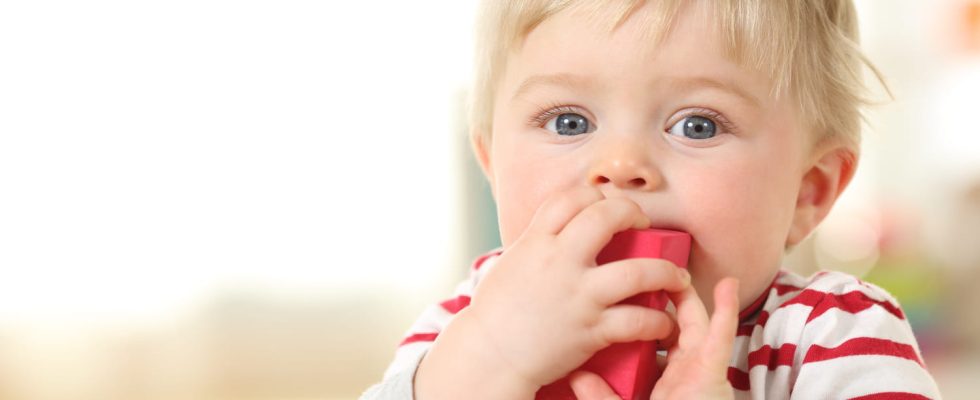Before the age of 3, there are many children who bite their mothers but also their comrades at the crèche. What does his bites express and how to react if they become very frequent? Advice from Jaqueline Wendland, psychologist and early childhood specialist.
Before the age of 3, babies sometimes feel the need to bite and some kids do it a lot more than others. Firstly because their teeth grow, but also because biting allows them to explore their environment. Their classmates at the crèche or with the childminder, but also their parents can also become more or less consenting victims! How to explain these baby bites? The answers of Jaqueline Wendland, clinical psychologist in the field of the care of the development of babies and young children, and author of Good night my little one (Ed. Solar).
At what age does a baby start biting?
It is from the age of about 8 or 9 months that babies begin to bite when he has a few teeth, to eat, but also to discover what surrounds him!
Why does baby bite other children?
“The teeth are used to explore, like a third hand. The baby can also bite as a way of expressing itself (while he does not yet have the language), or to release at a specific moment a tension related to hunger, excitement, boredom, frustration, impatience (having to wait, etc.), fear etc.“, explains Jaqueline Wendland.
“The baby can also bite as a way of expressing itself”.
What to do with a “biting” baby?
Some parents worry when they see their baby bite, especially when they sink their teeth into other children’s arms or faces. This concern may be legitimate, but above all it is necessary to de-dramatize this situation advises Jaqueline Wendland who also explains that it is necessary to explain to the child “that this is not possible, with a firm attitude, and if possible anticipate and intervene when you see that the child is about to do so“.
What to do if baby bites at nursery?
The crèche is a place where bites are commonplace because there are many children! But babies do not bite their friends for the same reasons as at home. “Often, this happens in a context of rivalry for a toy, or because another child was nearby at a time of frustration, over-excitement… Often the child bitten or more exposed to bites is generally not very mobile or more passive when it happens, he does not have time to anticipate, he is surprised“, explains Jaqueline Wendland.
“Often this happens in the context of a toy rivalry, or because another child was nearby at a time of frustration, over-excitement.”
Baby bites for kisses
It may sound strange, but a biting baby can also show his affection for his “victim”. The bite then expresses his love for her! If your baby is too demonstrative, explain to him that he can show his tenderness differently by, for example, giving a big hug to the person he loves.
Why does a baby bite its mother?
Mothers are often confronted with the bites of their babies quite simply because they are the people closest to them! “The mother’s body is a very attractive object of exploration for the baby who can feel it or touch the hair, eyes, mouth, jewelry, glasses, etc. This is completely normal for the first 18 months or so.” explains the specialist. But it is important that the mother explains to the child that he should not bite, that it hurts and that she does not let this gesture become trivialized, as if her body were available, she advises.
Jaqueline Wendland takes the opportunity to remind that mothers should not let their child climb on them or pull their hair without reacting. “The message given to the child is wrong and does not help him to grow, to learn the limits, the respect of the body of the other and his“, she adds.
Why does baby bite while breastfeeding?
Baby sometimes bites mother’s breasts during feeding because his teeth are growing, his gums hurt and it’s the only way he has found to relieve his pain! If this is the case with your baby, try not to react too strongly when he bites you and calmly explain to him that he shouldn’t do it anymore. Between and before feedings, relieve him by giving him a teething ring to chew on and massage the swollen area with a suitable balm.
